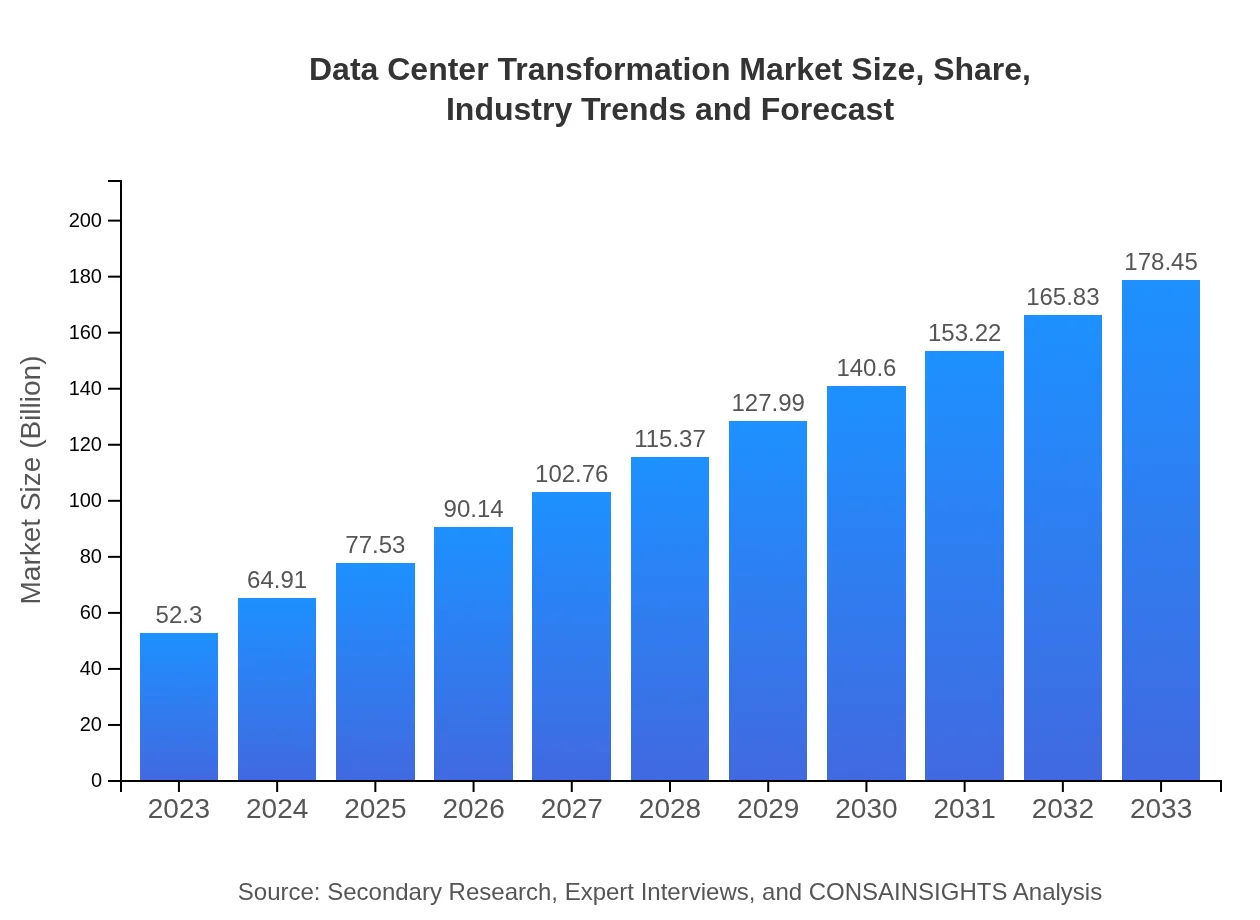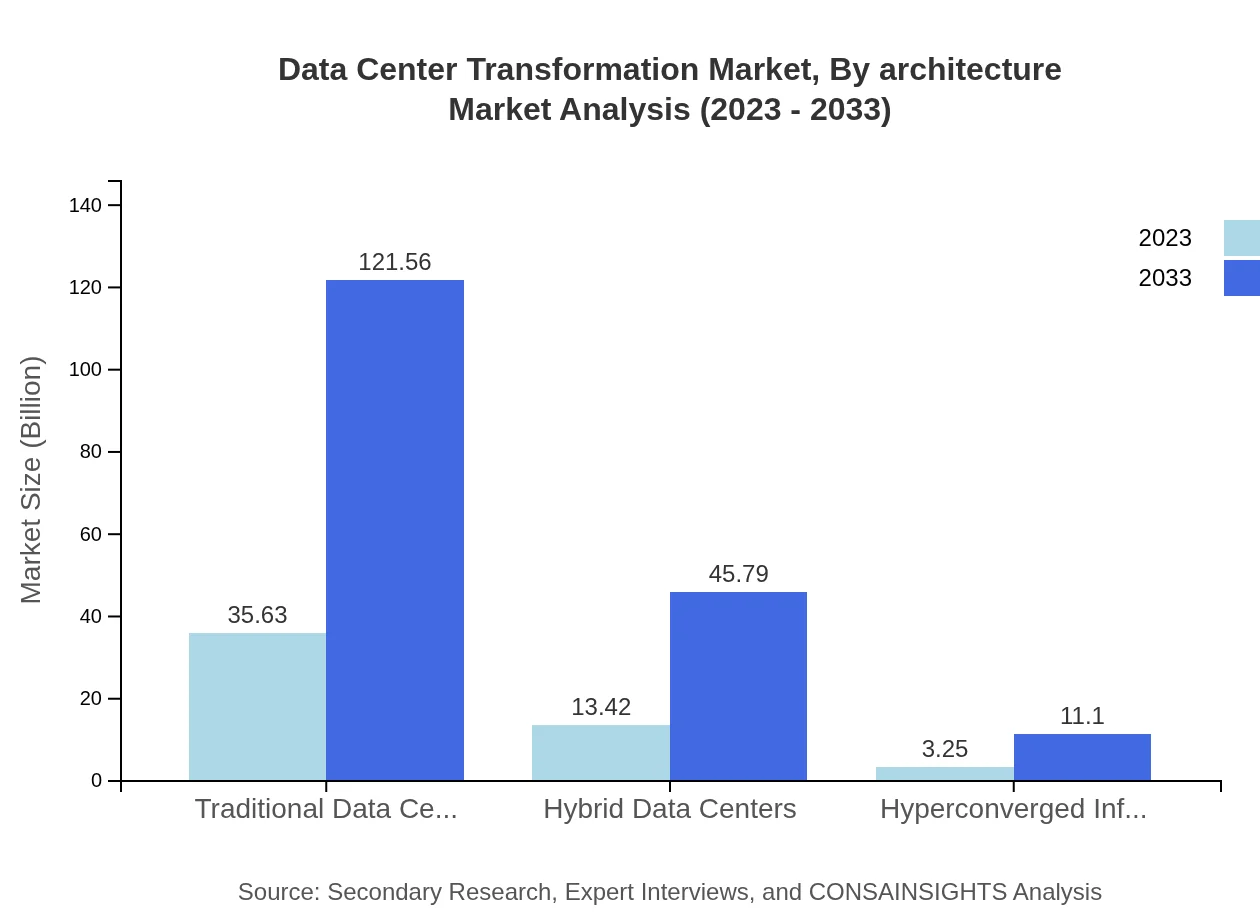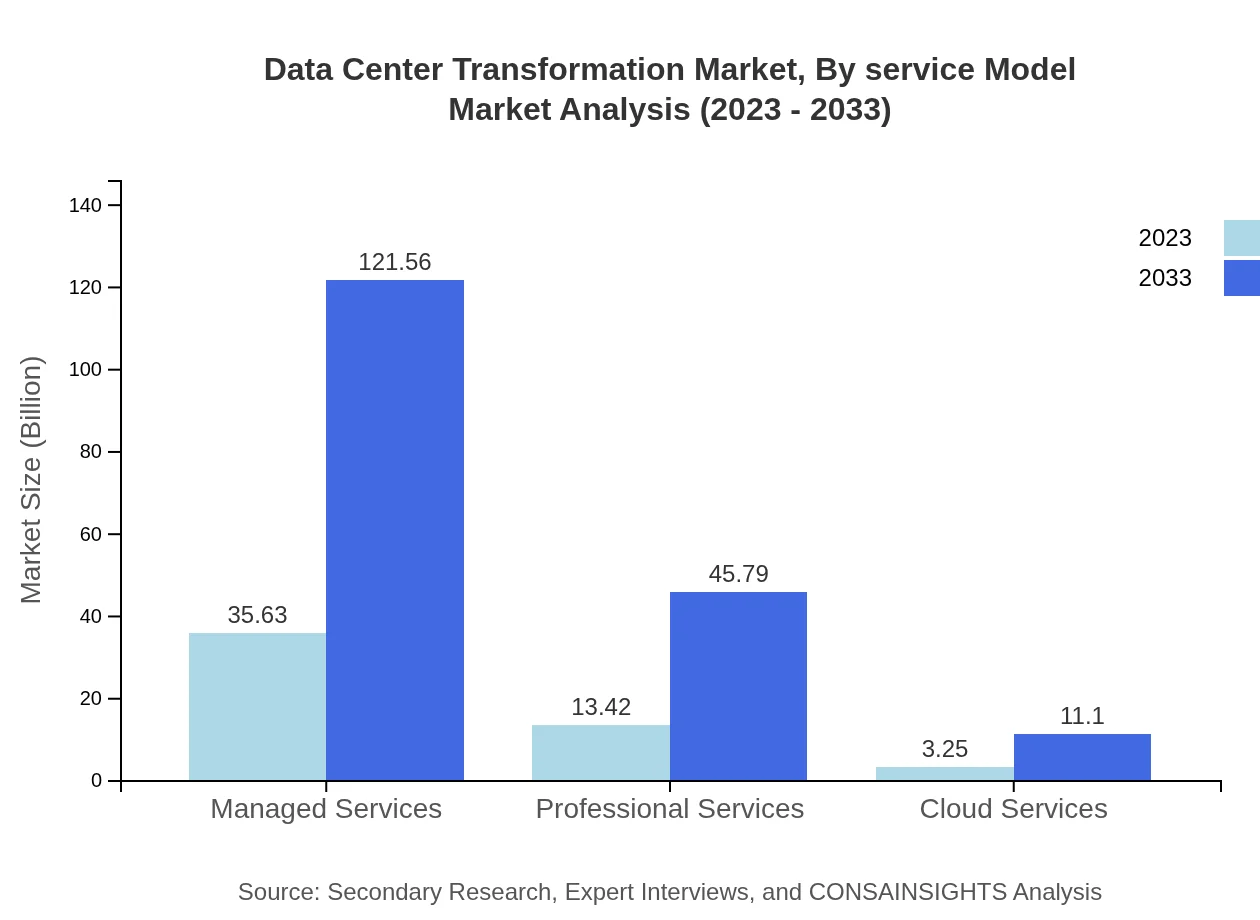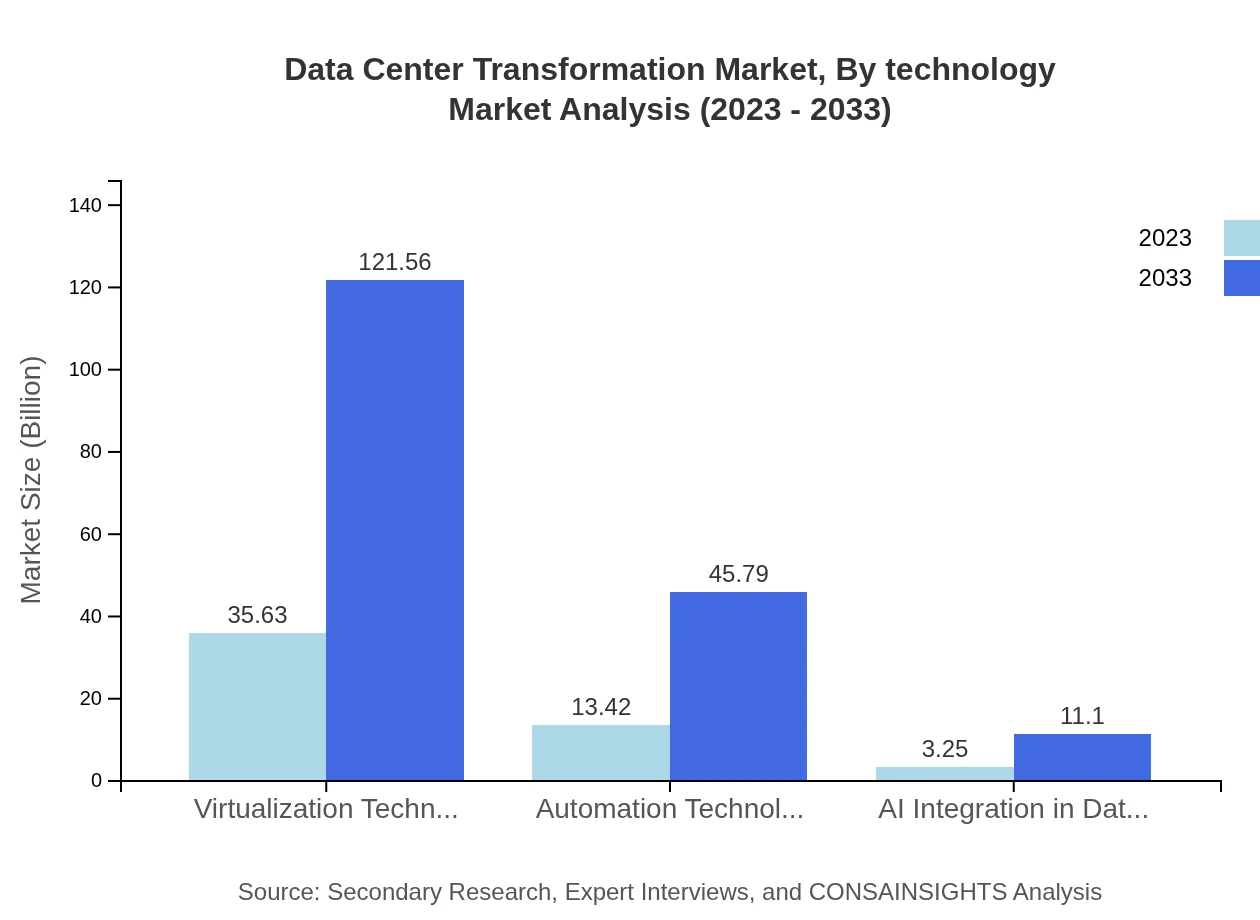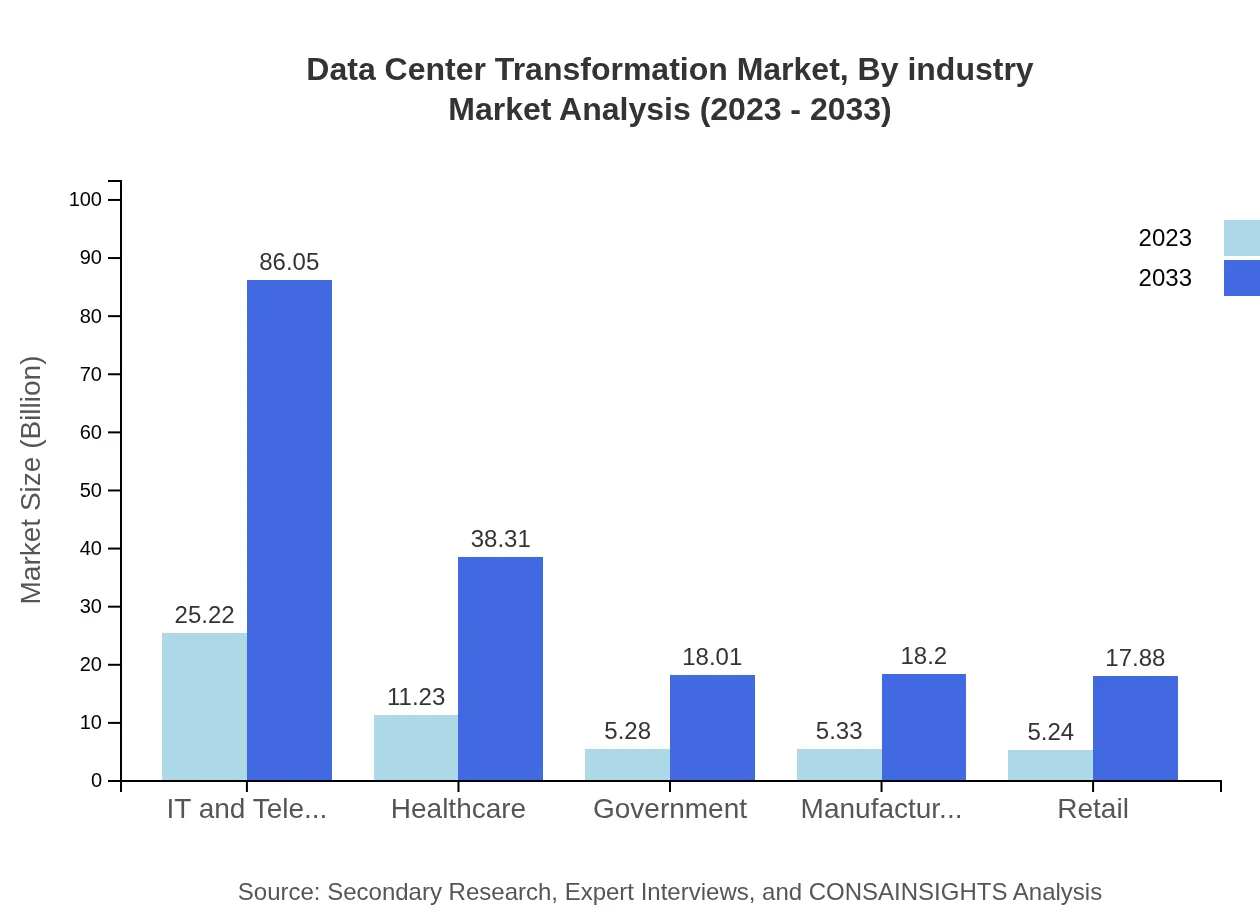Data Center Transformation Market Report
Published Date: 31 January 2026 | Report Code: data-center-transformation
Data Center Transformation Market Size, Share, Industry Trends and Forecast to 2033
This report provides a comprehensive analysis of the Data Center Transformation market, detailing insights into the current landscape, future trends, segmentation, and competitive landscape, covering the forecast period from 2023 to 2033.
| Metric | Value |
|---|---|
| Study Period | 2023 - 2033 |
| 2023 Market Size | $52.30 Billion |
| CAGR (2023-2033) | 12.5% |
| 2033 Market Size | $178.45 Billion |
| Top Companies | Amazon Web Services (AWS), Microsoft Azure, IBM, Cisco Systems |
| Last Modified Date | 31 January 2026 |
Data Center Transformation Market Overview
Customize Data Center Transformation Market Report market research report
- ✔ Get in-depth analysis of Data Center Transformation market size, growth, and forecasts.
- ✔ Understand Data Center Transformation's regional dynamics and industry-specific trends.
- ✔ Identify potential applications, end-user demand, and growth segments in Data Center Transformation
What is the Market Size & CAGR of Data Center Transformation market in 2023?
Data Center Transformation Industry Analysis
Data Center Transformation Market Segmentation and Scope
Tell us your focus area and get a customized research report.
Data Center Transformation Market Analysis Report by Region
Europe Data Center Transformation Market Report:
The European market is expected to grow from $14.02 billion in 2023 to $47.82 billion by 2033. Stringent regulations around data security and energy consumption are propelling organizations to upgrade their infrastructure. Furthermore, the move towards sustainability and eco-friendly practices is influencing the design and operation of data centers.Asia Pacific Data Center Transformation Market Report:
In the Asia Pacific region, the market size is projected to grow from $11.23 billion in 2023 to $38.31 billion by 2033. The rapid urbanization, increasing internet penetration, and significant investments in smart city initiatives are facilitating this growth. Major economies like China and India are at the forefront of data center investments, driven by rising demands for cloud computing and big data analytics.North America Data Center Transformation Market Report:
North America remains the leading market for Data Center Transformation, with a revenue increase from $18.61 billion in 2023 to $63.49 billion in 2033. The United States and Canada are witnessing robust growth driven by high demand for data centers, advancements in cloud services, and the consistent push towards digital innovation across various sectors.South America Data Center Transformation Market Report:
South America shows a modest growth trajectory, expanding from $1.55 billion in 2023 to $5.30 billion in 2033. Despite economic challenges, countries like Brazil and Argentina are making noteworthy advancements in their IT infrastructure, driven by the growing trend of digitalization among businesses in the region.Middle East & Africa Data Center Transformation Market Report:
The Middle East and Africa market will see an increase from $6.89 billion in 2023 to $23.52 billion in 2033. This region is experiencing a digital transformation fueled by government initiatives to enhance economic diversification. Yet challenges remain due to varying levels of infrastructure development across countries.Tell us your focus area and get a customized research report.
Data Center Transformation Market Analysis By Architecture
The Data Center Transformation market, segmented by architecture, highlights the dominance of traditional data centers, which accounted for $35.63 billion in 2023 and is expected to grow to $121.56 billion by 2033. Hybrid data centers, on the other hand, are projected to rise from $13.42 billion to $45.79 billion as more businesses adopt hybrid strategies to balance on-premises and cloud resources. This shift reflects a growing interest in maximizing flexibility and scalability.
Data Center Transformation Market Analysis By Service Model
In the service model segmentation, Managed Services lead the market, expected to expand from $35.63 billion in 2023 to $121.56 billion by 2033. This growth is underpinned by increasing outsourcing of data management tasks to specialized service providers. Professional services also remain significant, rising from $13.42 billion in 2023 to $45.79 billion, highlighting the value of expert guidance in navigating the complexities of data center transformations.
Data Center Transformation Market Analysis By Technology
Virtualization technologies dominate the technology segmentation, projected to grow significantly from $35.63 billion in 2023 to $121.56 billion by 2033. Automation technologies are also prominent, expected to rise from $13.42 billion to $45.79 billion, as organizations aim to streamline operations and enhance efficiency. These technologies are crucial in driving the broader trend towards advanced data center management solutions.
Data Center Transformation Market Analysis By Industry
By industry, IT and Telecom lead the market with expectations of growth from $25.22 billion in 2023 to $86.05 billion by 2033. The healthcare sector is also gaining ground, projected to increase from $11.23 billion to $38.31 billion, highlighting the critical need for secure and efficient data operations in managing health information.
Data Center Transformation Market Trends and Future Forecast
Tell us your focus area and get a customized research report.
Global Market Leaders and Top Companies in Data Center Transformation Industry
Amazon Web Services (AWS):
AWS is a leader in providing cloud services, enabling seamless Data Center Transformation through its extensive suite of tools and platforms, empowering organizations to innovate and scale efficiently.Microsoft Azure:
Microsoft Azure offers a robust cloud platform that supports Data Center Transformation initiatives, focusing on hybrid solutions and advanced analytics capabilities.IBM:
IBM provides solution-driven products for Data Center Transformation, specializing in hybrid cloud technologies and AI integrations.Cisco Systems:
Cisco is known for its networking solutions that facilitate Data Center Transformation, focusing on secure and efficient data communication.We're grateful to work with incredible clients.









FAQs
What is the market size of data Center Transformation?
The global Data Center Transformation market is projected to reach approximately $52.3 billion by 2033, growing at a CAGR of 12.5% from its current market insights. The rapid growth reflects the increasing demand for modernized data infrastructures.
What are the key market players or companies in this data Center Transformation industry?
Key players in the Data Center Transformation industry include major tech companies, cloud service providers, and data management firms. Notable names often include leading firms that focus on IT infrastructure innovations and advanced cloud solutions.
What are the primary factors driving the growth in the data Center Transformation industry?
The growth in the data-center-transformation industry is primarily driven by increasing data traffic, the adoption of cloud services, and the need for enhanced energy efficiency among data centers. Additionally, advancements in automation and virtualization technologies significantly contribute.
Which region is the fastest Growing in the data Center Transformation?
The fastest-growing region in the Data Center Transformation market is North America, projected to increase from $18.61 billion in 2023 to $63.49 billion by 2033. Europe and Asia Pacific also show substantial market growth and strategic investments in this segment.
Does ConsaInsights provide customized market report data for the data Center Transformation industry?
Yes, ConsaInsights offers customized market report data tailored to specific needs within the Data Center Transformation industry. Clients can obtain tailored insights that align with unique business objectives and market strategies.
What deliverables can I expect from this data Center Transformation market research project?
Deliverables for a Data Center Transformation market research project typically include comprehensive market analysis, trend forecasting, competitive landscape reports, and specific segment breakdowns. Clients can expect insights into market dynamics and growth opportunities.
What are the market trends of data Center Transformation?
Market trends in the Data Center Transformation industry highlight an increase in hybrid and multi-cloud strategies, automation technologies, and AI integration. Additionally, there is a notable shift towards sustainable practices and energy-efficient data center operations.

